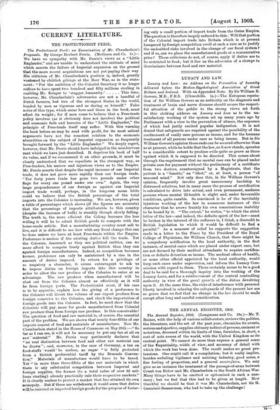CURRENT LITERATURE.
THE PROTECTIONIST PERIL.
ne Protectionist Peril : an Beamination of Mr. Chamberlain's Proposals. By George Herbert Perris. (Methuen and Co. is.)— We have no sympathy with Mr. Perris's views as a "Little Englander," and are unable to undersiand the attitude of mind which asserts the failure of Imperial expansion on the ground that the more recent acquisitions are not yet paying their way His criticism of Mr. Chamberlain's position ig, Andeed, greatly weakened by childish gibing,s at the Boer War, as in the state- ment: "For the ambition of the Colonial Secretary it no longer suffices to have spent two hundred and fifty millions sterling in enabling Mr. Kruger to stagger. .hnmanity This time, however, Mr. Chamberlain's adversaries are not a handful of Ditch farmers, but two of the strongest States in the world, headed by men as vigorous and as daring as himself." False notes of this type, which occur here and there in the book, must affect its weight; for if men come to believe that a Free-trade policy. involves (as it obviously does not involve) the political and economic fads and heresies of the "Little Englander," the principle of Free-trade itself may suffer. With this warning the book before us may be read with profit, for its most salient arguments have not the remotest relation to the economic absurdities .,3n the subject of Imperial expansion so frequently brought forward by the "Little Englander." We deeply regret, however, that Mr. Perris should have indulged in the mischievous cant which we have just described. It deprives his book of half its value, and if we recommend it on other grounds, it must be clearly understood that we repudiate in the strongest way, as Free-traders, his narrow and injurious views as to the Empire. Mr. Perris asserts that despite the rapid increase of our Imperial trade, it does not grow more rapidly than our foreign trade. "For forty . years trade has gone two pounds under other flags for every one pound under our own." Again, the very large preponderance of our •foreign as against our Imperial import trade would, perhaps, in the long-run mean little could we believe that the British percentage of the total imports into the Colonies is increasing. We are, however, given a table of percentages which shows (if the figures are accurate) that the percentage of imports attributable to this country (despite the increase of bulk) is steadily though slowly falling. The truth is, the more efficient the Colony becomes the less willing it will be to admit British goods to compete with the home-made article. But a manufacturing country must sell to live, and it is difficult to see how with any fiscal change this can be done unless we have at least Free-trade within the Empire. Preference is useless if the existing duties kill the trade. Yet the Colonies, inasmuch as they are political entities, can no more afford to compete freely against British than they can against' foreign manufacturers. Indeed, as competition becomes keener, preference can only be maintained by a rise in the amount of duties imposed. In. return for a privilege of so nugatory a character, it seems extravagant to ask us to impose duties on foreign imports into this country in order to allow the raw produce of the Colonies to enter at an advantage. The raw produce when manufactured will be shut out from the Colonies almost as effectively as it will be from foreign ports. The Protectionist must, if his case is to be arguable, explain how the giving of a preference to the Colonies will divert the volume of our export produce from foreign countries to the Colonies, and check the importation of foreign goods into the Colonies. In fact, he must show that the Colonists will pay, more 'for goods manufactured from Colonial raw produce than from foreign raw produce.- Is this conceivable ? The .question of food and raw material is, of course, the essential part of the problem. We are shown that nearly four-fifths of our imports consist of food and materials of manufacture. Now Mr. Chamberlain 'stated in the House of Commons on May 28th :—" So far as I can see, it will not be necessary to put any tax at all on raw -material." Mr. Perris very pertinently declares that "no 'real distinction between food and other raw material can be 'drawn" ; and, moreover, in the case of Germany, a tax on food-stuffe 'would be useless, as "sugar "is fully protected from a British preferential tariff by the Brussels Conven- tion." -Materials of manufacture would have to be taxed. Yet- " in more than three-fifths of the raw materials in which that* is' any substantial • competition between Imperial and foreign supplies, the former (to a total value of 'over 32 mil- lions. sterling) already practically rule their respective markets." - It is cleatry useless to protect a market that has attained its own monopoly. • . But if these are withdrawn; it would seem that duties will he imposed on imported foreign goods -foe the purpose of foster- Iing only a small portion of import trade from the Outer Empire. The question is therefore largely reduced to this : Will that portion of the Colonial import trade into Britain which is at present hampered by foreign competition swell at such a rate as to justify the undoubted risks involved in the change of our fiscal system P and if so, can we place the manufactured goods at a remunerative price ? These criticisms do not, of course, apply if duties are to be restricted to food ; but it lies on the advocates of a change to discriminate between food and raw material.






































 Previous page
Previous page